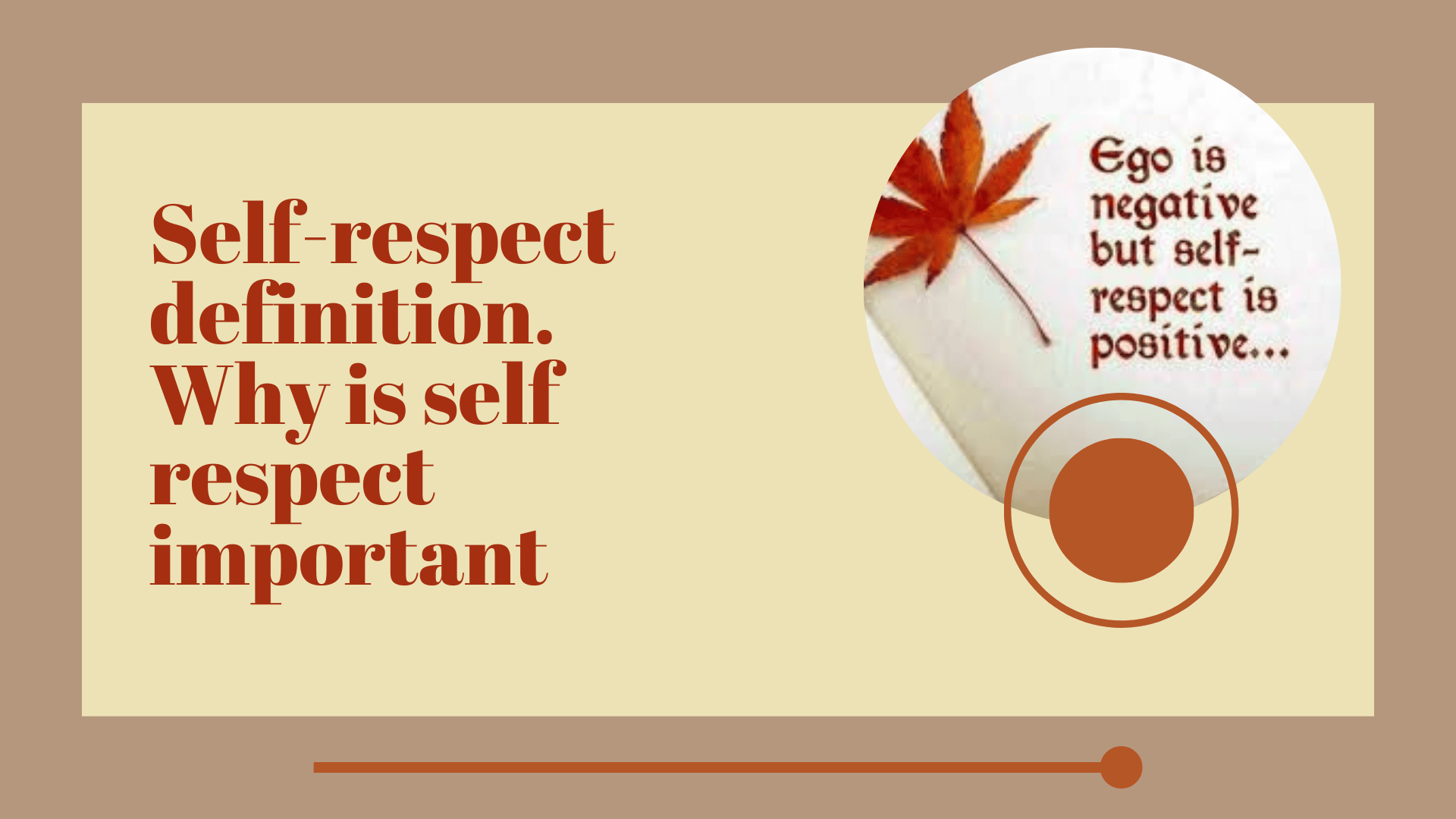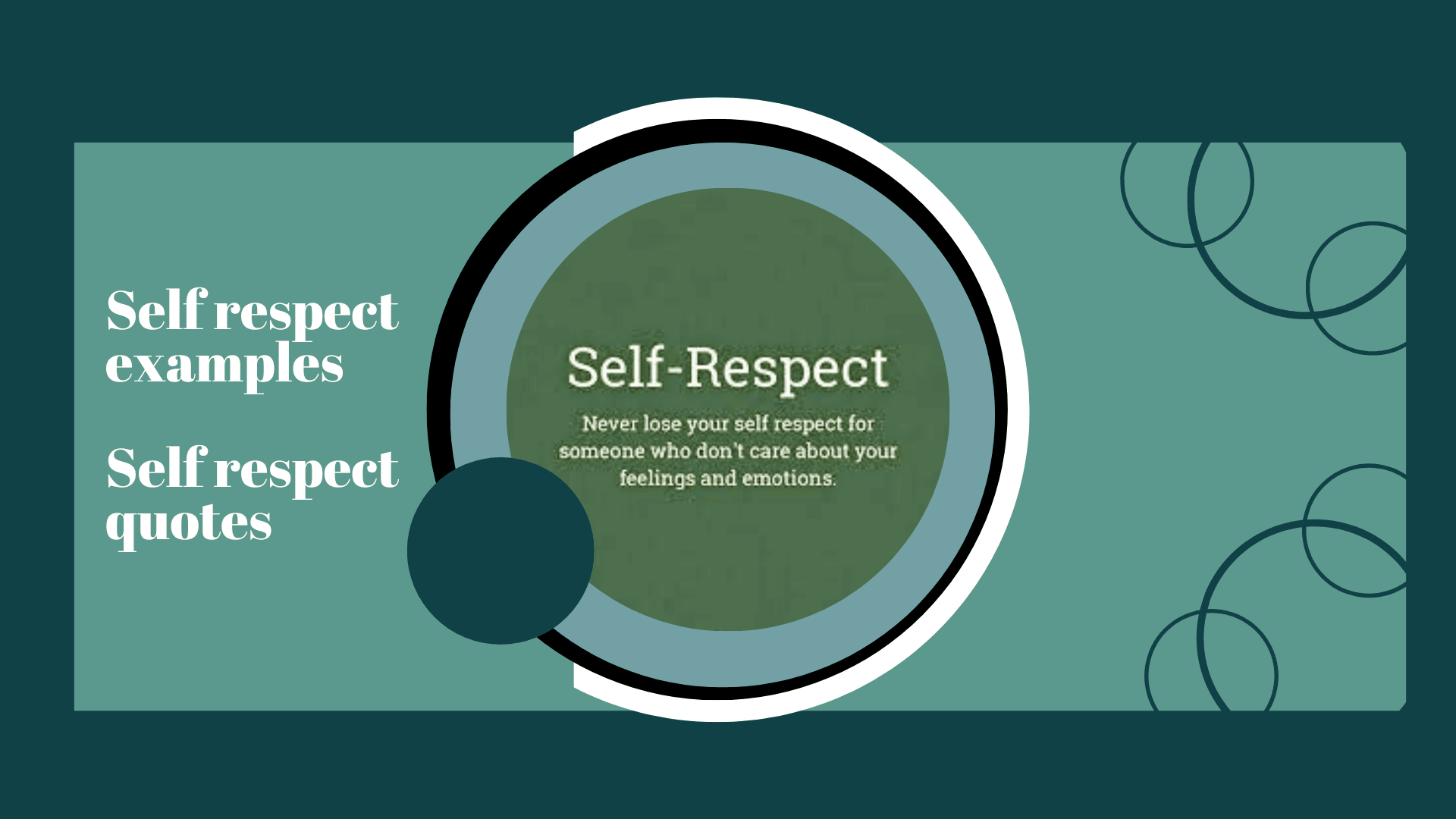Welcome to (International Stories). In this story, we will discuss 1 Self-respect definition l Why is self respect important. I hope you will like this and understand it.
Self-respect definition l Why is self respect important
Self respect definition
Self-respect refers to the belief and recognition of one’s own inherent worth, dignity, and value as an individual. It is the ability to honor and uphold one’s own values, beliefs, and boundaries, and to treat oneself with kindness, compassion, and understanding. Self-respect involves having a positive and healthy relationship with oneself, and it enables individuals to make decisions that align with their personal values and goals.
It is an important aspect of mental and emotional well-being, and it helps individuals to navigate their lives with confidence, self-assurance, and a sense of purpose.
Self respect examples
Self-respect refers to having a positive self-image and treating oneself with dignity, honor, and esteem. Here are some examples of behaviors that reflect self-respect:
Speaking up for yourself and expressing your needs and opinions in a clear and assertive way, without being rude or aggressive.
Taking care of your physical and emotional health by eating well, exercising regularly, getting enough rest, and seeking help when needed.
Setting healthy boundaries with others and not tolerating disrespect, abuse, or manipulation.
Pursuing your goals and aspirations with passion and determination, without giving up or settling for less.
Honoring your values and principles and living your life in a way that is aligned with your beliefs.
Accepting your flaws and imperfections, while striving to improve and grow as a person.
Treating others with kindness, empathy, and respect, without sacrificing your own needs and well-being.
Learning from your mistakes and failures, without blaming yourself or others, and using these experiences as opportunities for growth and self-improvement.
Celebrating your achievements and successes, no matter how small or big, and acknowledging your worth and contribution to the world.
Surrounding yourself with positive and supportive people who lift you up and inspire you to be the best version of yourself.
Self respect quotes
“Respect yourself and others will respect you.” – Confucius
“Self-respect is the fruit of discipline; the sense of dignity grows with the ability to say no to oneself.” – Abraham Joshua Heschel
“If you don’t respect yourself, don’t expect others to respect you.” – Unknown
“Self-respect is a question of recognizing that anything worth having has a price.” – Joan Didion
“To be yourself in a world that is constantly trying to make you something else is the greatest accomplishment.” – Ralph Waldo Emerson
“Self-respect is the cornerstone of all virtue.” – John Herschel
“The foundation of lasting self-confidence and self-esteem is excellence, mastery of your work.” – Brian Tracy
“Self-respect is not a function of size, age, or wealth. Bigness is an elusive and dangerous goal. I respect myself because I deserve respect.” – Nathaniel Branden
“The greatest thing in the world is to know how to belong to oneself.” – Michel de Montaigne
“Respect yourself enough to walk away from anything that no longer serves you, grows you, or makes you happy.” – Robert Tew.
Self-respect refers to the positive feelings and beliefs one has about themselves, based on their own actions, abilities, and achievements. It involves valuing oneself as an individual, setting healthy boundaries, and treating oneself with dignity and kindness.
Having self-respect means having a sense of self-worth and self-esteem, and believing in oneself and one’s abilities. It involves standing up for oneself and not allowing others to treat oneself poorly or disrespectfully. It also involves taking responsibility for one’s actions and decisions and learning from mistakes.
Self-respect is important for mental and emotional well-being, as it helps individuals develop a strong sense of identity and self-confidence. It also helps individuals build positive relationships with others, as they are more likely to attract and maintain healthy relationships when they have a strong sense of self-respect.
How to have self respect
Self-respect is a crucial aspect of living a fulfilling life, and it starts with valuing and believing in yourself. Here are some steps you can take to develop self-respect:
Identify your values: Knowing what you stand for and what matters to you is essential for building self-respect. Spend some time reflecting on your beliefs and values, and consider how you can align your actions with them.
Set boundaries: Self-respect means knowing your limits and being able to say no when something doesn’t align with your values or goals. Setting boundaries is important for protecting your time, energy, and resources.
Practice self-care: Taking care of yourself physically, mentally, and emotionally is crucial for developing self-respect. Prioritize your health, make time for hobbies and activities you enjoy, and practice self-compassion.
Be honest with yourself: Honesty with yourself is critical for building self-respect. Acknowledge your strengths and weaknesses, accept responsibility for your mistakes, and strive to improve.
Surround yourself with positive influences: The people you surround yourself with can significantly impact your self-respect. Seek out people who support and encourage you, and distance yourself from those who bring you down.
Remember that self-respect is a journey, and it takes time and effort to develop. By taking small steps every day, you can build a strong foundation of self-respect and live a more fulfilling life.
Self-respect is important because it plays a significant role in our overall well-being, self-esteem, and self-confidence. Here are some reasons why self-respect is important:
Healthy Relationships: When you have self-respect, you are more likely to attract and maintain healthy relationships with others. You are less likely to tolerate mistreatment or disrespect from others, and you are more likely to set boundaries and demand respect from others.
Improved Mental Health: Self-respect is a key component of good mental health. When you respect yourself, you are less likely to engage in negative self-talk or self-destructive behaviors. You are more likely to have a positive self-image and feel good about yourself.
Increased Self-Confidence: Self-respect is closely linked to self-confidence. When you have self-respect, you believe in yourself and your abilities, which can lead to increased self-confidence and a greater sense of self-worth.
Better Decision-Making: When you have self-respect, you are more likely to make decisions that are in your best interests. You are less likely to compromise your values or make decisions that could harm you in the long run.
Greater Success: Self-respect can also lead to greater success in life. When you respect yourself, you are more likely to pursue your goals and dreams with determination and persistence. You are less likely to give up when faced with obstacles or setbacks.
In short, self-respect is important because it is essential for our overall well-being, relationships, and success in life.
It’s important to note that self-respect can be a complex and subjective topic, and what one person may consider a lack of self-respect, another person may not. However, here are some general signs that could indicate someone may have a lack of self-respect:
Allowing others to mistreat or disrespect you without standing up for yourself or setting boundaries.
Engaging in self-destructive behaviors such as substance abuse, overeating, or engaging in risky behaviors that are harmful to your health and well-being.
Allowing others to make decisions for you, or not having a clear sense of what you want for yourself.
Constantly seeking validation or approval from others, rather than trusting in your own worth and abilities.
Putting the needs or wants of others before your own, to the point where you neglect your own well-being and happiness.
Belittling or degrading yourself, or allowing others to do so, by engaging in negative self-talk or accepting hurtful comments from others.
Engaging in relationships or situations that are clearly not healthy or beneficial for you, and staying in them despite obvious signs of toxicity or abuse.
Not taking care of your physical appearance or hygiene, or neglecting your own basic needs.
Lying or being dishonest with yourself and others, or engaging in behaviors that go against your own values and beliefs.
Believing that you are not deserving of respect, love, or success, and allowing this negative self-talk to dominate your thoughts and behaviors.
How to gain self respect
Gaining self-respect is a process that requires consistent effort and self-reflection. Here are some steps that you can take to start building self-respect:
Identify your values: What do you stand for? What’s important to you? Knowing your values will help you make decisions that align with your beliefs, and this will increase your sense of self-respect.
Set boundaries: It’s important to establish boundaries and communicate them to others. When you set boundaries, you’re letting others know what you will and won’t tolerate, and this helps you build self-respect.
Practice self-care: Take care of yourself physically, emotionally, and mentally. When you prioritize your well-being, you demonstrate to yourself that you value yourself and your health.
Avoid negative self-talk: The way you talk to yourself affects your self-respect. Try to avoid negative self-talk and instead, practice positive self-talk. Encourage and uplift yourself.
Take responsibility for your actions: When you make a mistake, own up to it and take responsibility for your actions. This shows that you have integrity and respect for yourself.
Celebrate your successes: Recognize and celebrate your achievements, no matter how small they may seem. This will help you appreciate yourself and build self-confidence.
Remember that building self-respect is a lifelong journey, and it takes time and effort. Be patient with yourself and keep working towards building a positive and healthy relationship with yourself.


Can you be more specific about the content of your article? After reading it, I still have some doubts. Hope you can help me.
Üsküdar tesisat arıza tespiti Rothenberger kaçak cihazı ve Testo termal kamera ile kısa sürede su kaçağını tespit ettiler. Üsküdar’da böyle bir hizmet bulmak harika! https://viracore.one/read-blog/1260
Blue Techker Very well presented. Every quote was awesome and thanks for sharing the content. Keep sharing and keep motivating others.